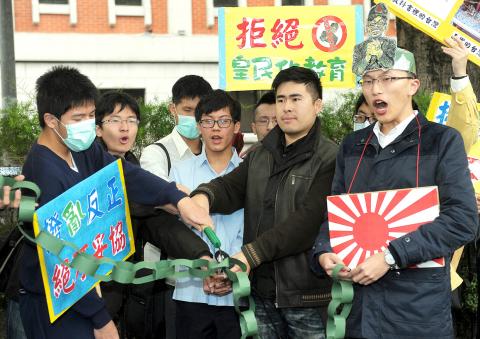A group of high-school students and young China-centered history advocates yesterday said they supported the changes the Ministry of Education (MOE) has proposed for the high-school history curriculum and urged it to stand firm against opposing views.
Following a wave of protests against the adjustments by history professors and students, political figures and high-school teachers over the past two weeks, a dozen young people, referring to themselves as the Anti-Independence-Oriented-History Front, yesterday defended the ministry.
Comprised of the Alliance of Students Safeguarding the Nation’s History, the New Youth Justice Alliance and the Association of New Chinese Children, the Front members raised banners that read: “No compromise to bringing order to chaos” and “Say No to Kominka education” in front of the ministry building in Taipei.

Photo: CNA
The Kominka movement refers to the Japanese endeavor during the Japanese colonial period to make Taiwanese loyal subjects of the emperor.
People at the rally said that the ministry’s adjustments were only to “justifiably have history written more in line with the Republic of China (ROC) Constitution” and said that they are people of ROC, not Japan’s imperial subjects.
Hou Han-ting (侯漢廷), a graduate political science student at National Taiwan University and the head of the school’s China Rise Club, said the textbook was “the execution of the will of the state” and so should teach history from the ROC’s point of view rather than from a Taiwanese independence viewpoint.
“The adjustments are only small changes to bring order to the chaos [incurred by the Democratic Progressive Party administration during its eight years in power],” Hou said.
“What’s wrong with telling the truth about Taiwanese history of Japanese persecuting Taiwanese and forcing some to become comfort women?” Hou added.
Chinese Culture University history graduate student Lin Ming-cheng (林明正) criticized the current textbook for introducing Taiwanese temples that enshrine Japanese police from the Japanese colonial period.
Lin showed pictures of Tainan City’s temples enshrining Koxinga (國姓爺) for “the re-conquest of Taiwan” and academic and bureaucrat Lin Zexu’s (林則徐) action against opium in 1838, pointing out that these cases indicated “the real Taiwanese society has a China-centered view of history.”
New Chinese Children Association head Wang Puchen (王炳忠) said critics who accused the MOE of acting to “de-Taiwanize” the nation had “blemished” the government’s effort, adding that the changes are not to devalue Taiwan, but to get rid of Kominka thinking.
“Real Taiwanese history can be seen as the history of modern China being encroached by colonial empires,” Wang said, adding that localization is not equal to Taiwanese independence.
Hou, Lin and Wang were the leaders of the movements supporting pro-China Want Want China Times Group in last year's media monopolization controversy.

Alain Robert, known as the "French Spider-Man," praised Alex Honnold as exceptionally well-prepared after the US climber completed a free solo ascent of Taipei 101 yesterday. Robert said Honnold's ascent of the 508m-tall skyscraper in just more than one-and-a-half hours without using safety ropes or equipment was a remarkable achievement. "This is my life," he said in an interview conducted in French, adding that he liked the feeling of being "on the edge of danger." The 63-year-old Frenchman climbed Taipei 101 using ropes in December 2004, taking about four hours to reach the top. On a one-to-10 scale of difficulty, Robert said Taipei 101

Nipah virus infection is to be officially listed as a category 5 notifiable infectious disease in Taiwan in March, while clinical treatment guidelines are being formulated, the Centers for Disease Control (CDC) said yesterday. With Nipah infections being reported in other countries and considering its relatively high fatality rate, the centers on Jan. 16 announced that it would be listed as a notifiable infectious disease to bolster the nation’s systematic early warning system and increase public awareness, the CDC said. Bangladesh reported four fatal cases last year in separate districts, with three linked to raw date palm sap consumption, CDC Epidemic Intelligence

Two Taiwanese prosecutors were questioned by Chinese security personnel at their hotel during a trip to China’s Henan Province this month, the Mainland Affairs Council (MAC) said yesterday. The officers had personal information on the prosecutors, including “when they were assigned to their posts, their work locations and job titles,” MAC Deputy Minister and spokesman Liang Wen-chieh (梁文傑) said. On top of asking about their agencies and positions, the officers also questioned the prosecutors about the Cross-Strait Joint Crime-Fighting and Judicial Mutual Assistance Agreement, a pact that serves as the framework for Taiwan-China cooperation on combating crime and providing judicial assistance, Liang

US climber Alex Honnold left Taiwan this morning a day after completing a free-solo ascent of Taipei 101, a feat that drew cheers from onlookers and gained widespread international attention. Honnold yesterday scaled the 101-story skyscraper without a rope or safety harness. The climb — the highest urban free-solo ascent ever attempted — took just more than 90 minutes and was streamed live on Netflix. It was covered by major international news outlets including CNN, the New York Times, the Guardian and the Wall Street Journal. As Honnold prepared to leave Taiwan today, he attracted a crowd when he and his wife, Sanni,